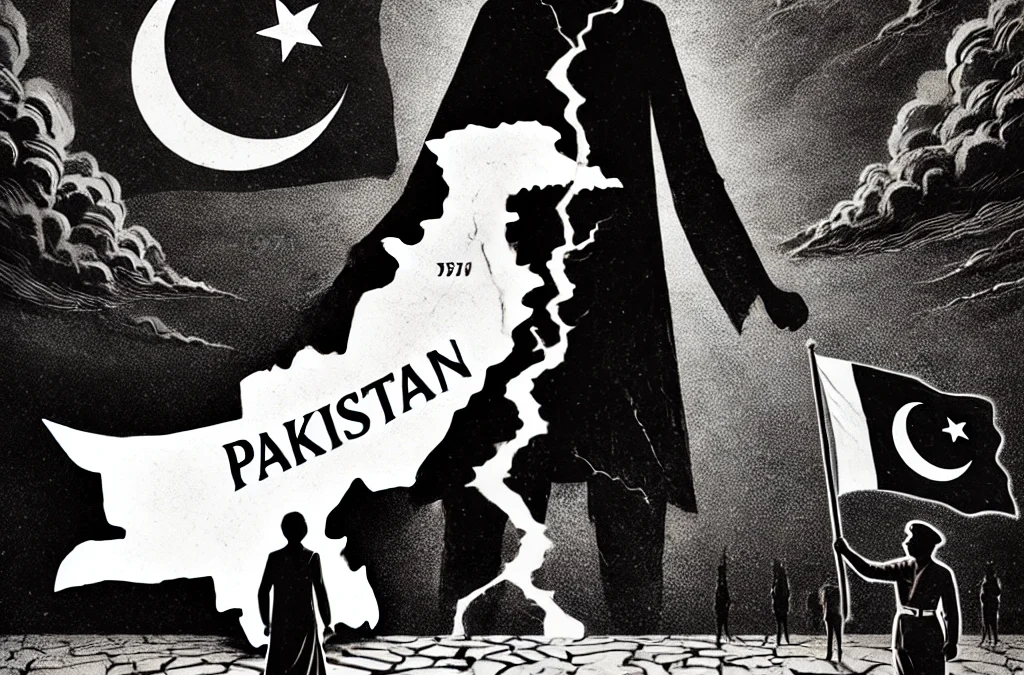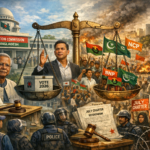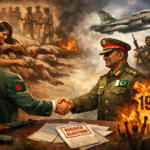Geopolitical Analysis: Pakistan Army’s Agenda to Rewrite the History of Bangladesh’s Liberation War
The Pakistan Army’s historical role in shaping geopolitics, particularly in South Asia, has been a contentious subject. Since the secession of East Pakistan and the formation of Bangladesh in 1971, the scars of that war remain a sensitive issue. Recent attempts by Pakistan’s establishment, particularly its military and allied political forces, to rewrite the narrative of the Bangladesh Liberation War through covert operations, propaganda, and alliances with radical entities like Jamaat-e-Islami (JI) are alarming. This essay explores the historical context, political maneuvers, evidence of conspiracy, and potential threats posed to Bangladesh’s sovereignty and regional stability.
Historical Context: The Legacy of 1971
The Bangladesh Liberation War of 1971 was a culmination of years of political, cultural, and economic marginalization of East Pakistan by the West Pakistani elite. The conflict saw the Pakistan Army unleash unparalleled atrocities, targeting Bengali civilians, intellectuals, and freedom fighters in what has been widely recognized as genocide. Central to the Pakistan Army’s war machine was Jamaat-e-Islami, which collaborated with the military to form paramilitary forces like Al-Badr and Al-Shams, responsible for heinous crimes against humanity.
However, with Bangladesh’s independence, Jamaat’s role was reduced to that of a disgraced collaborator. In subsequent decades, they rebranded themselves as a political entity while retaining their ideological alignment with Pakistan. This ideological synergy has now become a vehicle for Pakistan’s military establishment to propagate revisionist narratives and destabilize Bangladesh’s hard-earned sovereignty.
The Trinity: Pakistan Army, Jamaat, and 1975’s Killers
Pakistan Army’s Strategic Objectives
For the Pakistan Army, the loss of East Pakistan remains an enduring humiliation. The military’s interest in rewriting the narrative of 1971 stems from a desire to exonerate itself from war crimes and re-establish ideological hegemony over a region it once controlled. This agenda aligns with Pakistan’s broader strategy to project itself as the leader of the Muslim world and to counterbalance India’s influence in South Asia.
Jamaat-e-Islami: Pakistan’s Ideological Arm
Jamaat Bangladesh, an offshoot of Jamaat Pakistan, serves as the ideological link between the two nations. The group’s reemergence in Bangladeshi politics has been systematically fostered by Pakistan, both overtly and covertly. Jamaat’s rhetoric, which paints the Pakistan Army’s actions in 1971 as a patriotic defense of Islam, seeks to erode the historical consensus surrounding Bangladesh’s liberation. Through its media arms, social networks, and sympathetic elements within the Bangladeshi diaspora, Jamaat has attempted to cultivate a revisionist history that glorifies the actions of 1971’s collaborators.
Major Shariful Islam Dalim and the Killers of 1975
The 1975 coup d’état, which led to the assassination of Sheikh Mujibur Rahman, was orchestrated by a group of disgruntled army officers. Among them was Major Shariful Islam Dalim, a controversial figure whose actions epitomize the anti-liberation sentiments that persisted in the post-war military establishment. In recent years, Dalim’s resurfacing in interviews with individuals linked to Jamaat has raised concerns about a coordinated effort to delegitimize the Liberation War and the founding ethos of Bangladesh.
By casting doubt on the war and promoting narratives sympathetic to Pakistan’s agenda, figures like Dalim serve as pawns in a broader geopolitical game. Their actions are not merely historical revisionism but an insidious attempt to dismantle the collective identity of the Bangladeshi people.
Political Rhetoric and Propaganda
The Weaponization of Media
Propaganda plays a critical role in the Pakistan Army’s strategy to influence Bangladeshi society. The proliferation of YouTube channels, online forums, and social media accounts disseminating revisionist narratives underscores a deliberate effort to shape public opinion. By amplifying voices like Dalim’s and promoting content that glorifies Jamaat as a “patriotic” force, the Pakistan establishment seeks to sow discord within Bangladesh.
The Narrative of “Patriotism”
Central to this propaganda is the portrayal of Jamaat and the Pakistan Army as the true patriots of 1971. This narrative not only undermines the sacrifices of the Mukti Bahini and the Bangladeshi population but also attempts to erase the atrocities committed by Pakistani forces and their collaborators. Such rhetoric is a calculated affront to Bangladesh’s national identity, aimed at destabilizing the country from within.
Evidence of Conspiracy
Covert Funding and Training
Reports of covert funding to Jamaat and other sympathetic groups within Bangladesh have surfaced repeatedly. These funds, channeled through non-governmental organizations and religious charities, are often used to organize political campaigns, recruit members, and promote Islamist ideologies. Training camps allegedly operating in remote areas have also raised alarms about the potential for insurgency activities.
Alliance with Radical Entities
The nexus between Jamaat and other radical Islamist groups, both within and outside Bangladesh, poses a significant security threat. The Pakistan Army’s support for such alliances is evident in its historical use of non-state actors as tools for destabilization—a strategy it has employed in Kashmir, Afghanistan, and now potentially in Bangladesh.
Regional and Global Implications
Threat to Regional Stability
The revival of Jamaat’s influence and its alignment with Pakistan’s agenda could destabilize the entire South Asian region. Bangladesh’s geographic position makes it a strategic linchpin in the Bay of Bengal and the broader Indian Ocean Region. Any internal unrest or radicalization within Bangladesh could have ripple effects, threatening India’s security and regional trade routes.
Geopolitical Competition in the Indian Ocean
The Indian Ocean is a contested space, with major powers like India, China, and the United States vying for influence. Pakistan’s attempt to use Bangladesh as a base for covert operations and radicalization could exacerbate existing tensions. Such actions would undermine Bangladesh’s sovereignty and jeopardize its economic aspirations tied to maritime trade and connectivity projects.
The Fear of a Radical Takeover
The possibility of Bangladesh succumbing to radical Islamist forces is a genuine concern. Jamaat’s influence, coupled with Pakistan’s covert support, threatens to erode the secular foundations of the Bangladeshi state. A radicalized Bangladesh would not only be detrimental to its people but would also serve as a base for extremist activities, further destabilizing the region.
Implications for Governance
Infiltrating radical ideologies into Bangladeshi politics could lead to a breakdown of democratic institutions. Jamaat’s track record of using religion as a political tool is antithetical to the principles of democracy and pluralism. Their ascendancy could marginalize progressive voices and plunge the country into authoritarianism.
Conclusion: Defending Bangladesh’s Sovereignty
Bangladesh’s independence and sovereignty are the result of immense sacrifice and struggle. Any attempt to rewrite the history of 1971 or undermine the country’s foundational values must be met with resolute resistance. The Pakistan Army’s agenda, facilitated by Jamaat and figures like Major Dalim, represents a direct threat to Bangladesh’s national identity and regional stability.
To counter these challenges, Bangladesh must invest in preserving its historical narrative, strengthening democratic institutions, and fostering regional cooperation. Vigilance against covert operations, propaganda, and radicalization is essential to safeguarding the nation’s future. Bangladesh can continue to thrive as a free and independent state only through unity and adherence to the principles of liberation.






